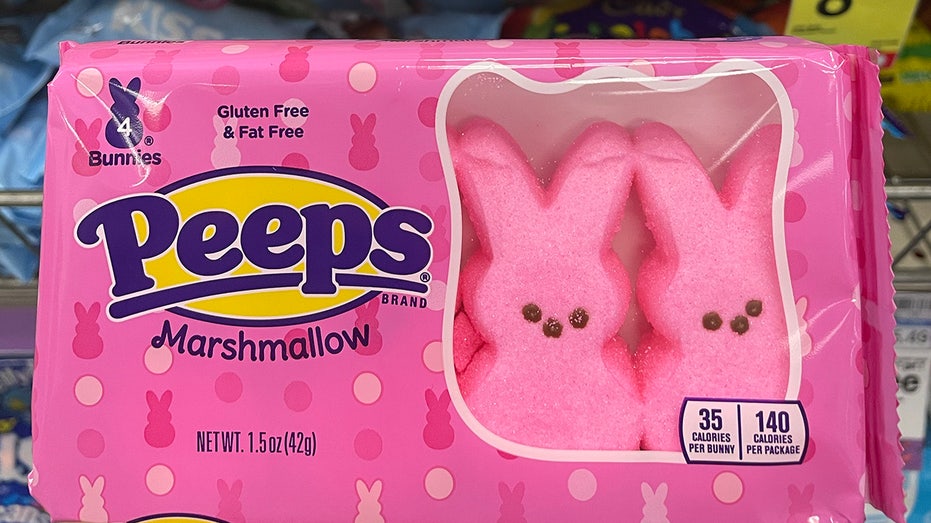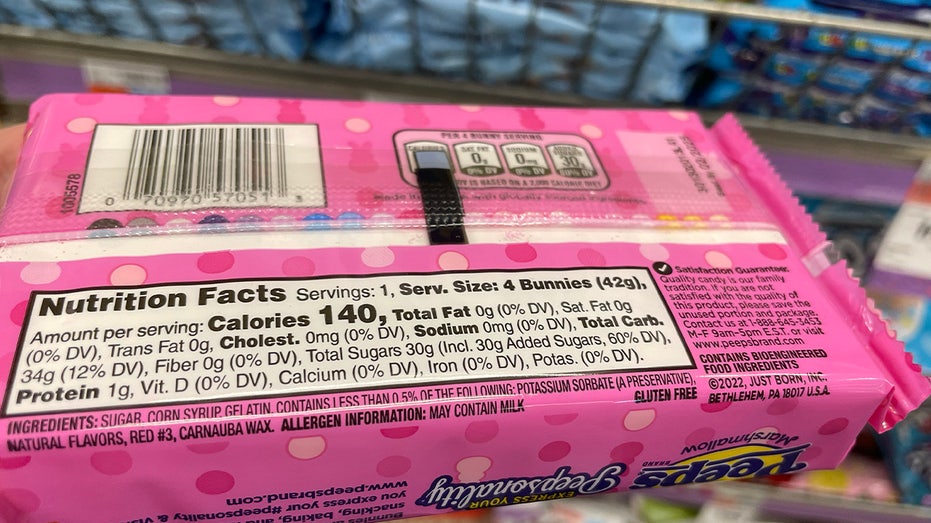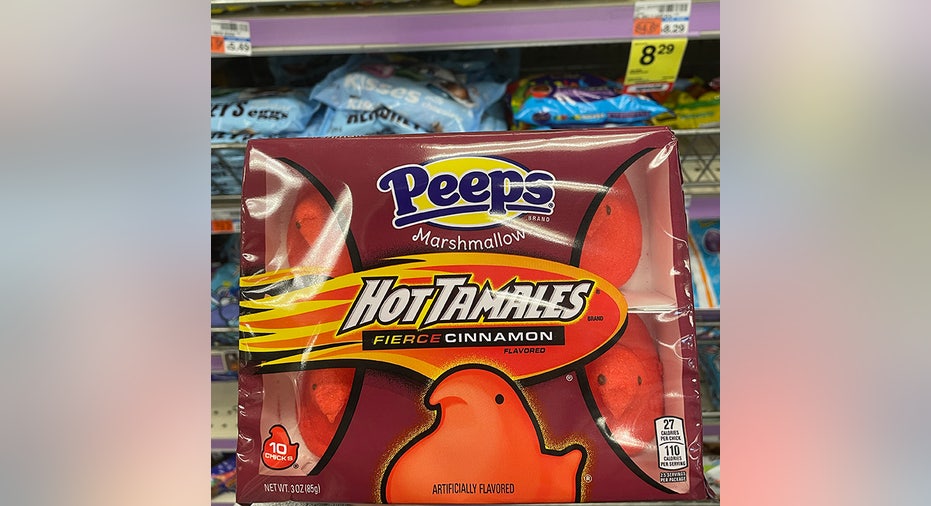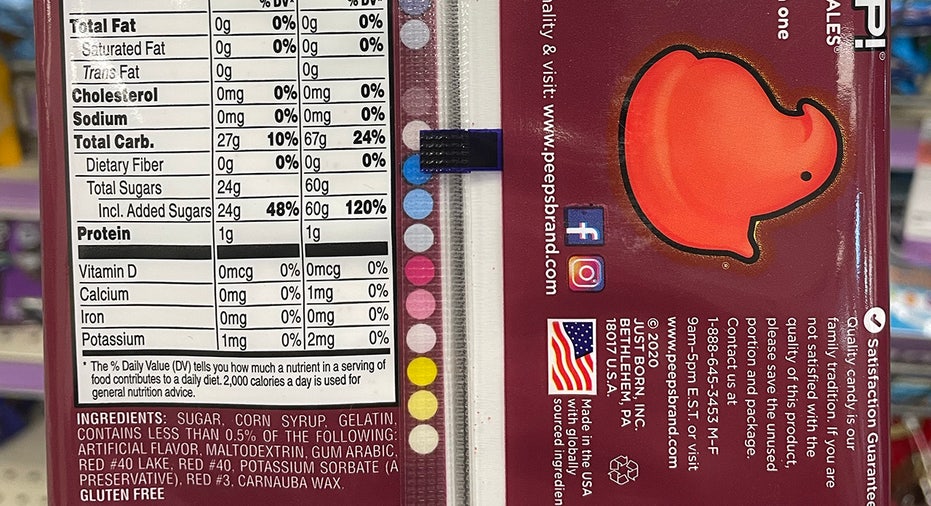Popular Easter candy called out for containing cancer-causing ingredient
Peeps manufacturer Just Born under fire for including Red Dye 3 in some treats — company replied in statement
An Easter sweets staple is under fire for a concerning ingredient.
Peeps are currently being called out for containing Red Dye 3, a known carcinogen, according to studies by the National Institutes of Health (NIH).
This includes Peeps Pink Marshmallow Chicks, Peeps Pink Marshmallow Bunnies, Peeps Lavender Marshmallow Chicks and Peeps Lavender Marshmallow Bunnies, according to Consumer Reports.
Other Just Born products containing Red Dye 3 include Hot Tamales candy, Peeps Hot Tamales Marshmallow Chicks, Party Cake Peeps, Peeps Fruit Punch Marshmallow Chicks and Peeps Wildberry Marshmallow Bunnies.
Earlier this year, nonprofit Consumer Reports called on Peeps manufacturer Just Born to end the use of Red Dye 3 in its products, according to a press release issues on Monday, April 3.

Consumer Reports is calling for cancer-causing Red Dye 3 to be removed from products like pink-colored Peeps manufactured by Just Born. (Angelica Stabile/Fox News Digital / Fox News)
Consumer Reports said that it did not receive a response from Just Born, nor has the manufacturer announced plans to change its processes.
Senior staff scientist for Consumer Reports Michael Hansen, PhD, wrote in a statement that parents should know "purple and pink colored Peeps they may be putting in their kids’ Easter basket are made with an ingredient that is a known carcinogen."
AMERICANS' FAVORITE EASTER CANDIES AND PASSOVER FOODS REVEALED: INSTACART SURVEY
"Just Born Quality Confections should stop making its iconic marshmallow treats with this dangerous food chemical since other less risky alternatives are readily available," he said.
In response to a query from Fox News Digital, Just Born on Monday sent along a statement, writing in an email that "FD&C Red #3 is currently an approved colorant for use in candy by the FDA."

Assorted Peeps marshmallows are shown on a table in Washington, D.C., on April 2, 2021. (EVA HAMBACH/AFP via Getty Images / Getty Images)
"We manufacture all our candies in compliance with FDA regulations, sourcing our ingredients and packaging exclusively from reputable suppliers who adhere to high quality and safety standards," the company said.
"We also provide consumers with information on our packaging and our websites to help them make informed choices about our products."
PEPSI, PEEPS DOING LIMITED-TIME RELEASE OF MARSHMALLOW SODA IN STORES ACROSS COUNTRY
The manufacturer also wrote that its product development team is "continually exploring opportunities to provide expanded options for our consumers, including colors derived from natural sources that can deliver the same visual impact and stability as their certified counterparts."
The callout of Peeps follows a newly proposed bill from the California State Legislature that would ban the use of Red Dye 3 and other harmful additives.
A package of Hot Tamales Peeps in stock at a CVS Pharmacy in New York City. | Fox News
These other additives include brominated vegetable oil, potassium bromate, propylparaben and titanium dioxide, according to the proposal.
"Californians shouldn’t have to worry that the food they buy in their neighborhood grocery store might be full of dangerous additives or toxic chemicals," said Jesse Gabriel, an assembly member, in a statement.
Consumer Reports joined the Center for Science in the Public Interest in October to urge the FDA to ban Red Dye 3 from all food products.
The organization delivered a petition to the FDA on Monday, signed by nearly 35,000 consumers, calling for the prohibition of these cancer-causing chemicals in foods.

The back of a package of pink Peeps bunnies lists Red Dye 3 as an ingredient per FDA requirement. (Angelica Stabile/Fox News Digital / Fox News)
Some artificial colors in foods have also been linked to adverse effects on the attention and activity levels in children, as well as allergic reactions, according to WebMD.
There are more than 2,900 food products on the market that contain Red Dye 3, according to Environmental Working Group.
Hansen of Consumer Reports mentioned that while the FDA has banned the use of Red Dye 3 in cosmetics since 1990, it "inexplicably is still allowed in food."
BOB BORN, CANDY EXECUTIVE AND ‘FATHER OF PEEPS,' DEAD AT 98
"The widespread use of Red Dye 3 is particularly concerning since it is found in many products marketed to children who are especially at risk of developing health problems from exposure," he said.
"It’s time for the FDA to protect public health by getting Red Dye 3 out of our food."

A display of marshmallow Peeps in a variety of flavors and styles such as Hot Tamales and Fruit Punch, in the Easter Candy section of the Port Clinton Peanut Shop in Port Clinton, Pennsylvania, on March 18, 2021. (Ben Hasty/MediaNews Group/Reading Eagle via Getty Images / Getty Images)
Registered dietitian and nutritionist Ilana Muhlstein agreed, suggesting that the FDA has the "power to help" in an email sent to Fox News Digital.
"The FDA has the power to help reduce the risk of cancer in the U.S. by clearing the U.S. food system of several known harmful ingredients but, instead, chooses not to," she said.
GET FOX BUSINESS ON THE GO BY CLICKING HERE
"What is alarming is that it seems, from public perception, that the FDA is standing in greater defense of American candy and food companies than they are of the U.S. population," she also said. "It calls into question the potential conflicts of interest at hand."
While cancer is one of the leading causes of death for children in the U.S. — with obesity impacting 20% of children ages six to 11, according to CDC statistics — Muhlstein suggested it should be intuitive for the FDA to deploy "tighter control over food manufacturers."

Registered dietitian and nutritionist Ilana Muhlstein said the FDA has the "power to help" the public's health. (Ilana Muhlstein / Fox News)
"We should feel safe knowing that the food on our shelves, and marketed to children, in the U.S. is the food we can feel good about consuming."
As harmful ingredients are taking a "noticeable toll on our declining cognitive and physical health," Muhlstein said that in her view, the FDA needs to "step up and further protect Americans by banning Red Dye 3 and other questionable ingredients in our food supply to preserve their credibility as a health organization."
An FDA spokesperson responded to FOX Business regarding these additives.
CLICK HERE TO SIGN UP FOR OUR LIFESTYLE NEWSLETTER
"The FDA is actively reviewing a petition filed for FD&C [Food, Drug and Cosmetic Act] Red No.3," the spokesperson said in an emailed statement.

"We should feel safe knowing that the food on our shelves, and marketed to children, in the U.S. is the food we can feel good about consuming," said registered dietitian Ilana Muhlstein. (iStock / iStock)
" FD&C Red No. 3 has been previously evaluated by the FDA," the statement continued, noting that it is regulated by the FDA as a "color additive."
The spokesperson added, "The FDA has two authorizing color additive regulations, one for food and one for ingested drugs."
The statement also said that the color additive "Red No. 3" is a "certified color."
CLICK HERE TO READ MORE ON FOX BUSINESS
The FDA requires all color additives to be listed on product labels so that they can be identified by consumers, the FDA continued, adding that "consumers who wish to limit the amount of color additives in their diets may check the food ingredient list on labels."























